Bhishma (pitamah) information, facts, names, age, parents | How many days Bhishma was on arrow bed
Namaste friends, how are you doing today? Welcome to #BhagavanBhakthi website / blog.
Bhagavan Lord Sri Vishnu (Krishna) (Rama) blessings to you and your family!
In this website / blog, you will always learn about #Hinduism #Sanskrit language.
Also subscribe to my YouTube channel from this link #BhagavanBhakthi to view videos about #Hinduism #Sanskrit language.
Just before going to “Bhishma (pitamah) information, facts, names, age, parents | How many days Bhishma was on arrow bed“, let us have some brief information.
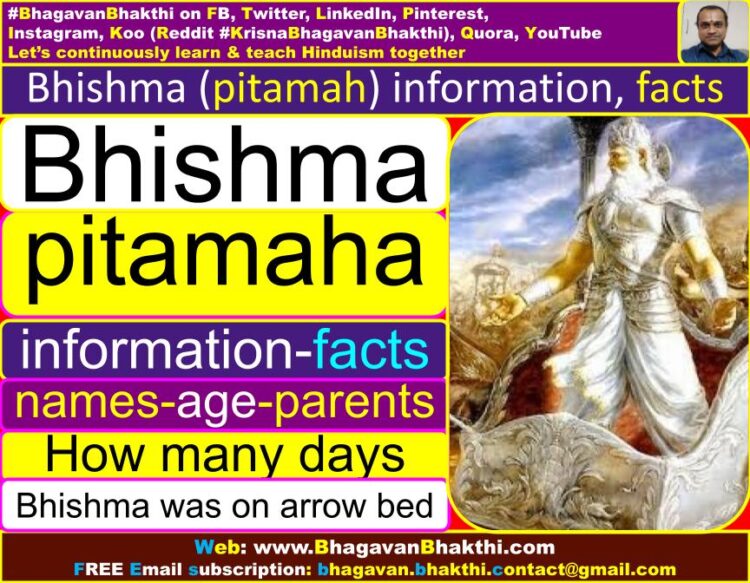
Bhishma name meaning is : In Sanskrit Bhishma means ‘taking terrible pledge (oath)’. Bhishma = Bhish + Ma = Terrible pledge + taking. Also Bhishma means ‘taking bhayankara pledge (oath)’, that is, taking fearsome pledge.
Original or first name of Bhishma is : Devavrata.
Different names of Bhishma are : Devavrata, Gauranga, Pitamah, Gangaputra, Mahamahim, Kurushreshth, Shantanu Nandana, Ganga Nandana, etc.
Weapons of Bhishma are : He was an allrounder and has mastered in bow and arrow, sword fighting, axe fighting, gada (mace) fighting, spear fighting.
Parents of Bhishma are : Shantanu (father), Ganga (mother). Ganga was directly the Goddess Sri Ganga Devi). Shantanu was an avatar of Lord Sri Varuna Deva.
Information about Bhishma birth and early life is as given below:
Many know that the epic Mahabharata was composed by Lord (Rishi) Sri Vedavyasa Ji, an incarnation of Lord Sri Vishnu. The birth and youth of Bhishma is narrated in the Adi Parva of the Mahabharata.
Bhishma was the only surviving son of King Shantanu and Goddess Sri Ganga Devi among the 8 children (sons), a king belonging to the Chandravansh (lunar dynasty).
According to the epic Mahabharata, Devavrata (Bhishma) is an incarnation of Vasu, alias Prabhasa.
As per Mahabharata, King Shantanu, the youngest son of King Pratipa (Kuru kingdom), was out hunting when he saw a beautiful woman on the banks of the river Ganga.
King Shantanu fell in love with Ganga and expressed his desire to marry her.
The beautiful woman agreed to Shantanu’s proposal, but with a condition that “he (Shantanu) should never question Ganga for her deeds and if this condition is broken, she will immediately abandon him”.
Shantanu agrees to Ganga’s terms and gets married and begins a happy married life with her. However, when their first child was born, the queen drowned the child in the Ganges. This continued till their 7th child.
When Ganga was about to throw her eighth child into the river, King Shantanu, unable to control himself, stopped her and questioned her about her actions.
On hearing Shantanu’s words, Ganga revealed herself as Goddess Sri Ganga Devi and justified her actions and narrated the below story.
Once the eight heavenly Vasus and their wives were enjoying themselves in the forest when Dyu’s (Bhishma) wife saw the divine cow and asked her husband to steal it.
The cow was none other than the divine cow Nandini, daughter of the wish-fulfilling cow Surabhi. This cow was owned by the Maharishi Vashishtha.
With the help of his brothers, Vasu, i.e. Dyu (Bhishma), tried to steal Nandini, but Maharishi Vashishtha caught them and cursed them to be born as mere mortals on earth and suffer a miserable life.
On their plea, Maharishi Vashishtha showed mercy upon the eitht Vasus and told the other seven Vasus that they would be liberated soon after their birth.
However, Dyu (Bhishma), the thief’s leader, is cursed to endure a long life on earth.
Hearing this, King Shantanu was filled with grief and Goddess Sri Ganga Devi decided to abandon him as her condition was broken. Before disappearing, Goddess Sri Ganga Devi promised to return her heir (Devavrata / Bhishma).
Ganga named her son as Devavrata and took him to various lokas (realms) where he was raised and trained by many eminent Rishis and Maharishi.
Information about Bhishma’s education and his different Gurus (teachers) is as given below:
Markandeya Maharishi : One of the Chiranjeevis (immortal) and the son of Sage (Rishi) Mrikandu of the lineage of Maharishi Bhrigu, taught Devavrata about the duties of Yatis.
Lord Sri Indra Deva : The King of the Devatas (Demigods) bestowed celestial weapons on Devavrata (Bhishma).
Brihaspati & Shukracharya : Both of them taught Devavrata the duties of statesmanship (Rajneeti) (punitive policy), political science (Rajyashastra) and other sciences.
Sanatkumara : Sanatakumara, the eldest son of Lord Sri Brahma, taught mental and spiritual sciences to Devavrata (Bhishma).
Maharishi Vashishtha & Maharishi Chyavana : Both of them taught the Vedas and Vedangas (parts of Vedas) to Devavrata (Bhishma).
Lord Sri Parashurama : The son of Maharishi Jamadagni and Renuka trained Bhishma in various warfares.
Bhishma and King Ugrayudha story (story which explains about the greatness and strength of Bhishma):
Ugrayudha, the King of Ajamidha lineage, was very famous. He was a very powerful King. He even had got the Chakra-ayudham (disc weapon) from Lord Sri Vishnu.
However King Ugrayudha then got arrogancy. With power and proudness, he used to unnecessarily wage wars with other Kings.
King Ugrayudha had stopped thinking about ‘Dharma-adharma’, justice and injustice, possibility and impossibility. None used to stand before him in war.
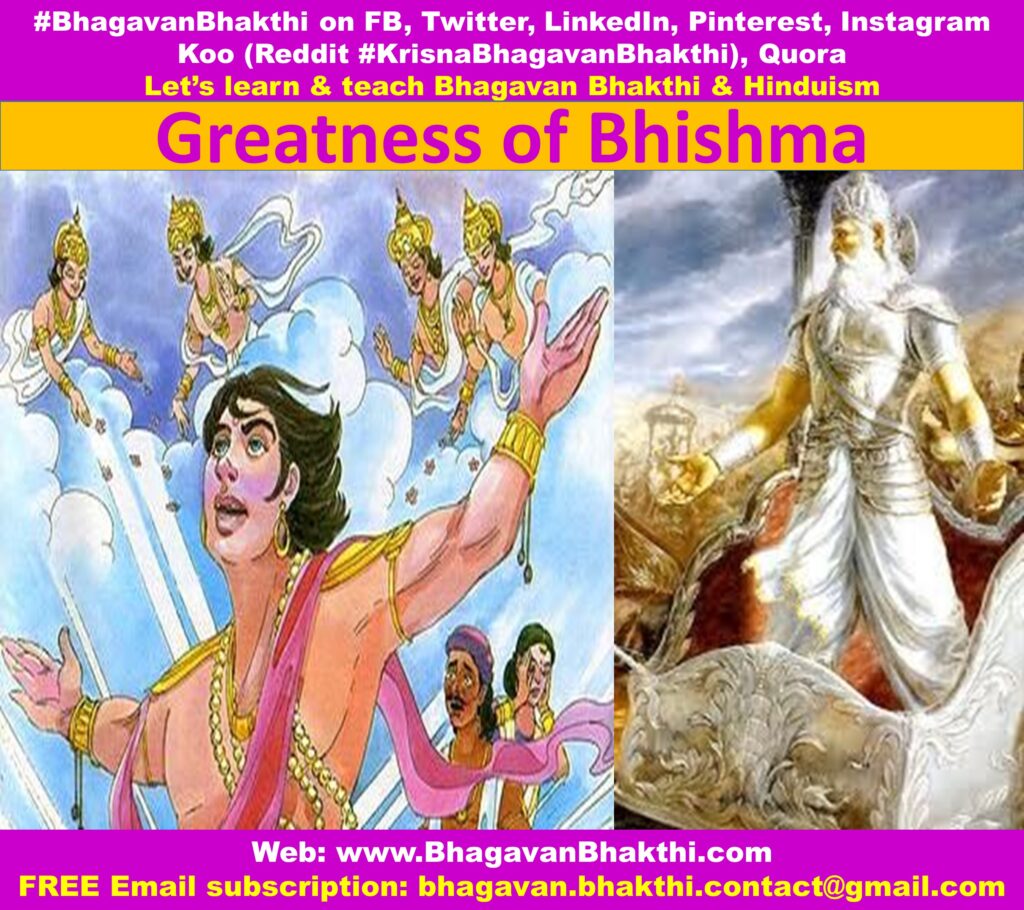
Many became his saamanta-rajas, others lost their lives in the war. This increased his arrogancy.
Once, King Ugrayudha heard that Devavrata (Bhishma) was a great warrior. He heard that on the whole earth, no one can defeat him.
King Ugrayudha then decided to wage a war against Devavrata (Bhishma), thus he took a huge soldiers’ army and reached Hastinapura.
Just at that time the father of Devavrata (Bhishma), that is, King Shantana died. Bhishma was very sad. The ‘Shraaddha-karma’ was not yet over by that time. Only few days had passed.
Ugraayudha thought it was the right chance and send an ambassador to Devavrata (Bhishma):
“Bhishma! There is no one who can defeat me. You also know this. You also know the power of my Chakra-ayudham (disc weapon).”
“I don’t want your wealth, kingdom. I want Matsya Devi, the most beautiful, ‘Satyavatii Devi’. I will give you one day time”.
Bhishma became very angry listening to the slang words (incorrect language) from the King Ugrayudha.
Bhishma couldn’t bear that someone spoke like this about his mother and Pativrata, ‘Satyavati Devi’.
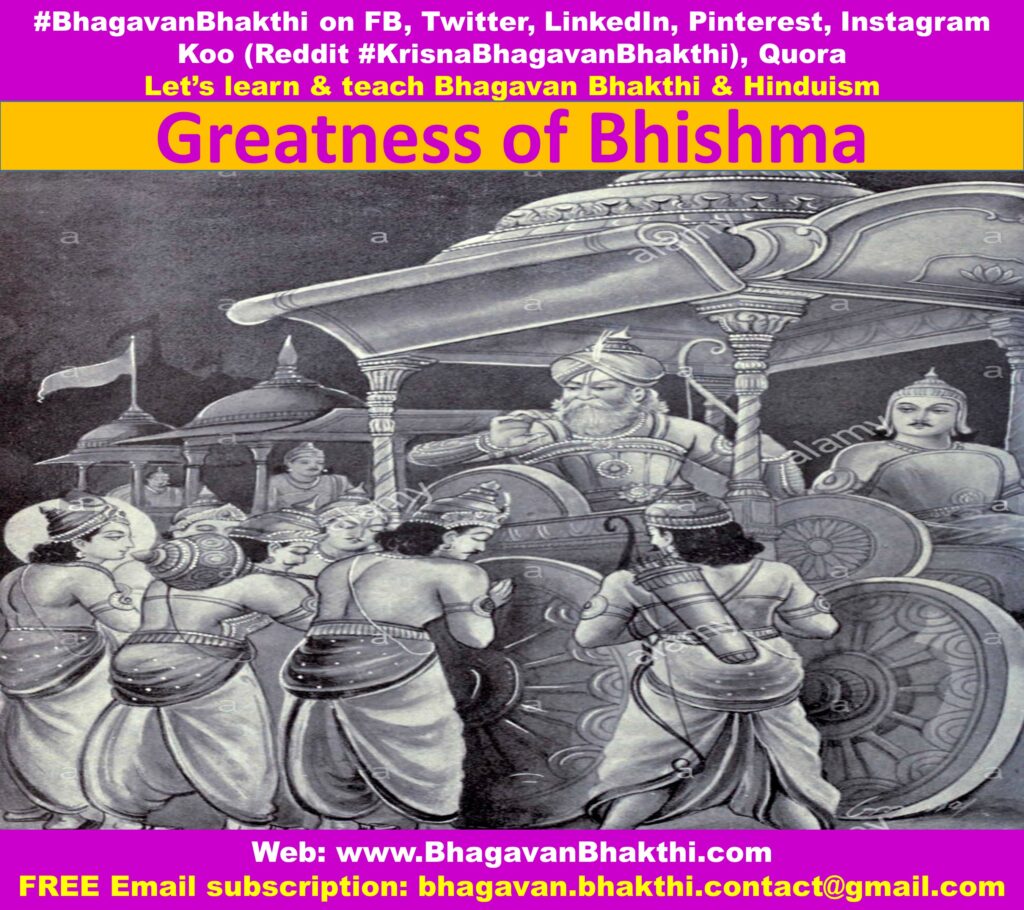
Immediately Bhishma ordered war against the heinous minded King Ugrayudha.
However, the Panditas, Purohitas and ministers of Bhishma said “O Dharmatma! Bhishma! King Ugrayudha is like a Pipiilakam (ant) before you.”
“There is no need for you to fight a war with him. Also your father’s ‘Shraaddha-karma’ is not yet over. Shraaddha is the most important thing in ‘Pitru-karyas’ (father rituals). You must not hold weapons for now.”
“Also one must always try to avoid war, because of its evil effects on the society.”
“Hence you send a Doota / ambassador, use ‘Saama-daana-Bheda’ ideas and try. Then later you can try punishing him. By that time the ‘Pitru-karyam’ will also be over”.
The great Bhishma, listened to the advise of the Panditas and other ministers and sent an ambassador to King Ugrayudha.
However all the efforts of the ambassador went waste. The arrogant King Ugrayudha never listened to them. In fact he immediately used his Chakra-ayudham (disc weapon) on Bhishma.
However even the Chakra-ayudham became a waste weapons against Bhisham, because of the Paativratyam of Satyavatii Devi and righteousness of Bhishma!
The Chakram (disc) kept on spinning, but didn’t move an inch! King Ugrayudha used all his skills, but the Chakra-ayudham never moved.
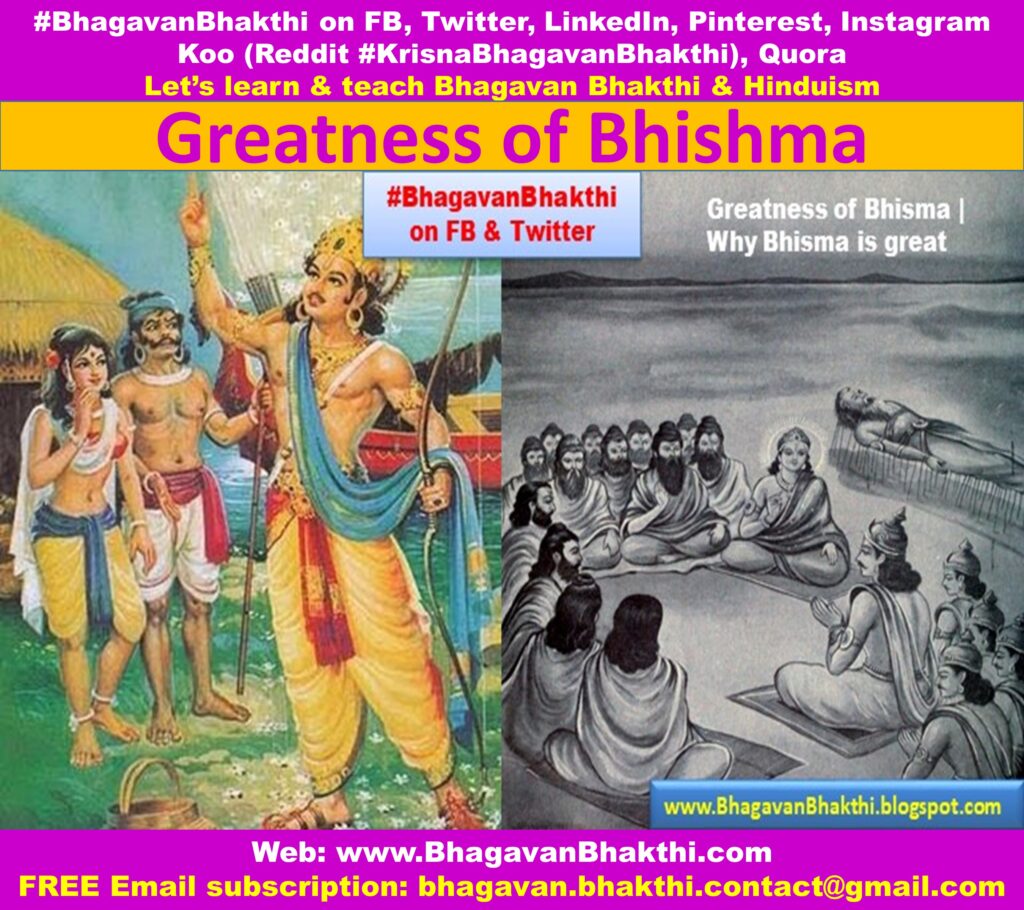
King Ugrayudha thought “Chakra-ayudham is more powerful than ‘Brahmastram’. What is stopping it? May be because Bhishma now has ‘Aashouchakam’ (death uncleanliness of his father Shantanu), the Chakram is not approaching him. I will wait till the Aashouchakam is over”.
However, even after the Pitru-karma (father’s rituals) was over, the Chakra-ayudham didn’t move, it stayed in the same place in the air, spinning. King Ugrayudha was amazed.
In no time Bhishma reached the place, along with his younger brother Vichitraveerya. In the hands of the great Bhishma, King Ugraayudha lost his life.
Seeing the strength of Bhishma, even the Devatas (Demigods) were surprised.
All the people who were supporting King Ugraayudha, then did ‘Stuti’ (praise) of Bhishma. This is the greatness of the great man Bhishma.
On his literal death bed of arrows, Bhishma shared three very important secrets about women with Yudhisthir as given below:
1. A family’s financial luck is directly related to a woman.
2. A home where a woman is disrespected can never be happy or flourish.
3. According to Bhishma Pitamah, a home where a woman’s needs are not tended to on priority like your own or there exists chauvinistic thought process – there can never be abundance.
Whether it be the mighty King of Lanka, Ravana or the entire force of 100 Kuru brothers, they couldn’t survive disrespecting a woman.
Ravana abducted Mother Sita, whatever said and done he was the most learned man of his time, however it does not entail being courteous.
Similarly, Kauravas humiliated their own Sister-in-law on a public forum. Today, there is no descendant from Ravana or Kauravas to continue the family name.
Now let us move forward and understand the following:
Who was Bhishma? What he was in his earlier life? What was his name in his earlier life? and other information as given below:
First let us know the meaning of the word ‘Ashta Vasu’:
Ashta Vasu = Ashta + Vasu = Eight + Vasu (a group of Devatas).
Vasus are a class of Vedic Devatas / deities (Demigods) and they are eight in number and thus they are known as ‘Ashta Vasus’.
These are the elemental Devatas / Demigods who are associated with Lord Sri Indra Deva (Lord of Svarga / Heaven).
Ashta Vasus represent the basic aspects of nature, that is, cosmic natural phenomenon and they are as given below:
All the names of the ‘Ashta Vasus’ differ in their nomenclature names in various granthas / sacred texts and puranas.
There is no similarity in the list of the names.
This could be because, they are the same set known names, but with different variety of names, that is, same Vasus, but one Vasus may have different names.
(This to similar to the common people on earth, who usually have different names, that is, one person with more than one name).
Names of ‘Ashta Vasus’ as per few of versions are as given below:
Prithvi / Earth | Agni / Fire | Jala / Water | Vayu / Wind | Akasha / space / sky | Surya / Sun | Chandra / Moon | Nakshatras / Stars |
One is as below:
Ahas | Anala | Anila | Dhara | Dhruva | Pratyuusha | Prbhaasa (Bhishma) | Soma |
Second is as below:
Anala (paavaka-agni-fire) | Anila (praana-vaayu-air) | Apa (jala-varuna-water) | Dhara (bhoomi-earth) |
Dhruva (Nakshathra-star) | Prabhaasa (light-brilliance-radiance) | Pratyuusha (dawn) | Soma (divine nectar-nourisher)
Third is as given below:
Drona | Dhruva | Dosha | Arka | Agni | Dyau / Dyu (Bhishma) | Praana | Vibhavasu |
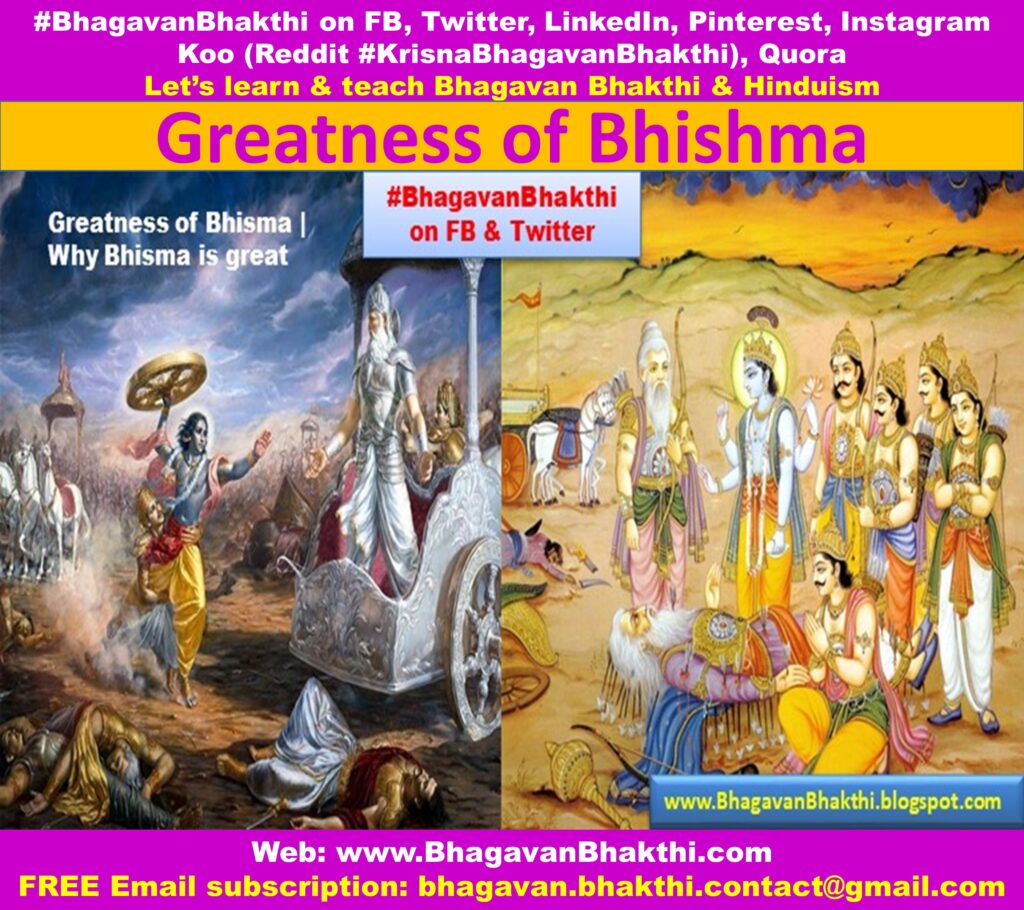
Here we should note that, Anala is one of the names of Ashta Vasus. Similarly, Anala is another name of Fire God Agni which is insatiable.
Lord Sri Vishnu is also known as Anala (we can refer this with the shloka no. 32, 76 of Vishnu Sahasranama stotram), means, he is the one whose strength and energies are infinite and unlimited, have no bounds and is insatiable.
Among Ashta Vasus, Anala (Agni) stands first. Anila is another name of ‘Praana, that is, Vayu Deva (The Air God).
Lord Sri Vishnu is known as Anilah (shloka no. 25 of Sri Vishnu Sahasranama stotram).
Lord Sri Vishnu is the main life force and the source of life for everyone and without Lord Sri Vishnu even Vayu / air can’t sustain by itself.
Also similarly, Lord Sri Vishnu is called as Somah (shloka no. 54 of Vishnu Sahasranama Stotram) the divine nectar (and provider of nectar) and the nourisher & protector of all the vegetation.
Vasu (read is Vasu and not as Vaasu) means dweller or dwelling.
In shloka no. 29, 74 of Sri Vishnu Sahasranama stotram, we can find a reference to the word Vasu. Here Lord Sri Vishnu is eulogized as Vasuh.
Lord Sri Vishnu is the dweller from everywhere and everything dwells in Him.
Lord Sri Vishnu is popularly known as ‘Vasudeva’ (read as Vaasudeva and not Vasudeva), that is, he the head of ‘Vasus’ (read as Vasu and not as Vaasu).
Meaning of Vaasudeva = Vaasu + Deva, that is, Deva means the Lord and Vaasudeva (Vishnu) is the Lord of ‘Vasus’ (read as Vasu and not as Vaasu).
Lord Sri Vishnu is the one who Himself is a ‘Vasu’.
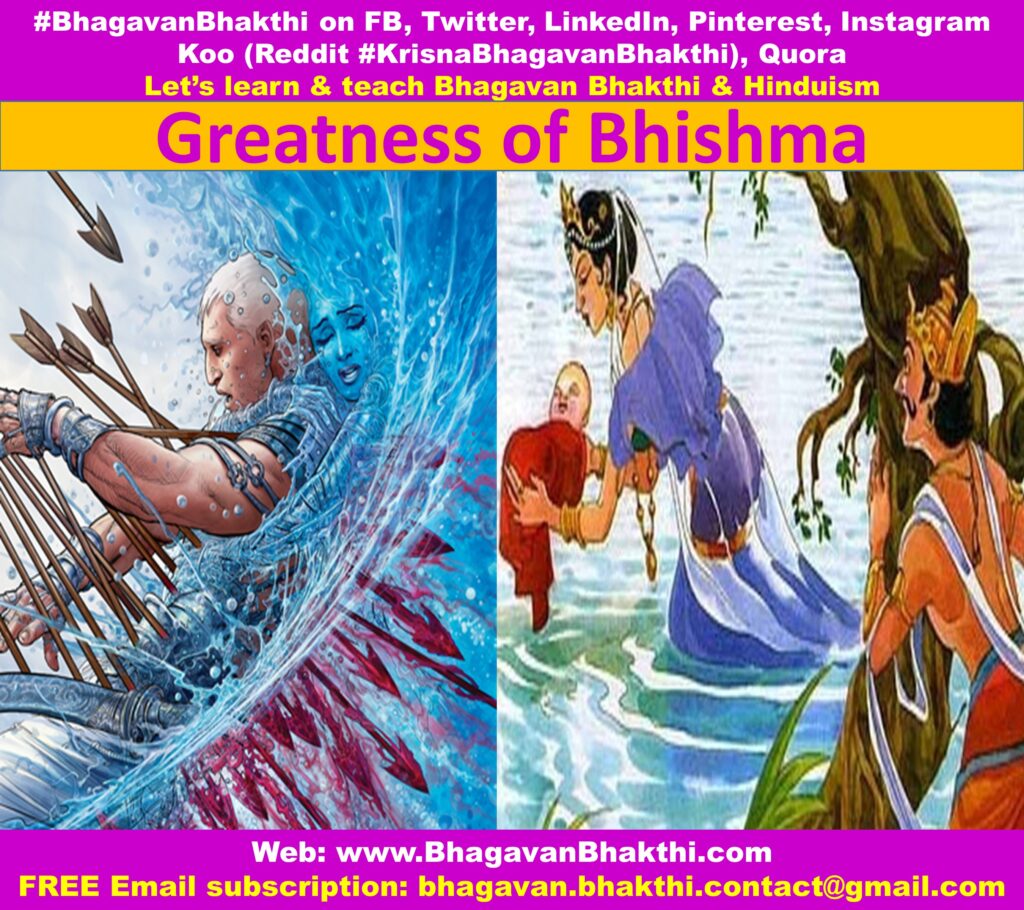
In Srimad Bhagavad Gita of ‘Vibhooti Yoga’, in 10th chapter, Lord Sri Krishna says that, “Vasuunaam Paavakaschaasmi”, that is, ‘I am (Lord Sri Krishna) the Agni among Vasus’, (Paavaka is another name of Agni Deva).
In the 28th Dvapara Yuga (the Yuga when Lord Sri Krishna took the avatar), ‘Ashta Vasus’ took birth on earth as sons of the Goddess Sri Ganga Devi and Kuru Kingdom King Shantanu due to a curse from Maharshi Vasishtha.
Among eight Vasus, seven of them got liberated from this mortal world as soon as they took birth, whereas the eighth one by name:
Dyau / Dyu or Prabhasa (Bhishma) had to endure a longer life. This Vasu named Dyau / Dyu was none other than the great warrior of Mahabharata fame Bhishma (Devavrata).
Also, we should note that, Lord Sri Krishna’s foster father Nanda Gopa was an avatar of one of the Ashta Vasus and his name was Drona (not the Dronacharya).
Along with Ekadasha (11) Rudras + Dvadasha (12) Adityas + Prajapati + Vashatkaara, ‘Ashta Vasus’ (8 Vasus) form a significant group of 33 number main Devatas / Demigods.
Ekadasha Rudras according to Padma Purana / Srimad Bhagavatam are as give below:
Manyu | Manu | Mahanasa | Mahan | Shiva | Rta-Dhvaja | Ugra-Reta | Bhava | Kaala | Vaamadeva | Dhrta-Vrata |
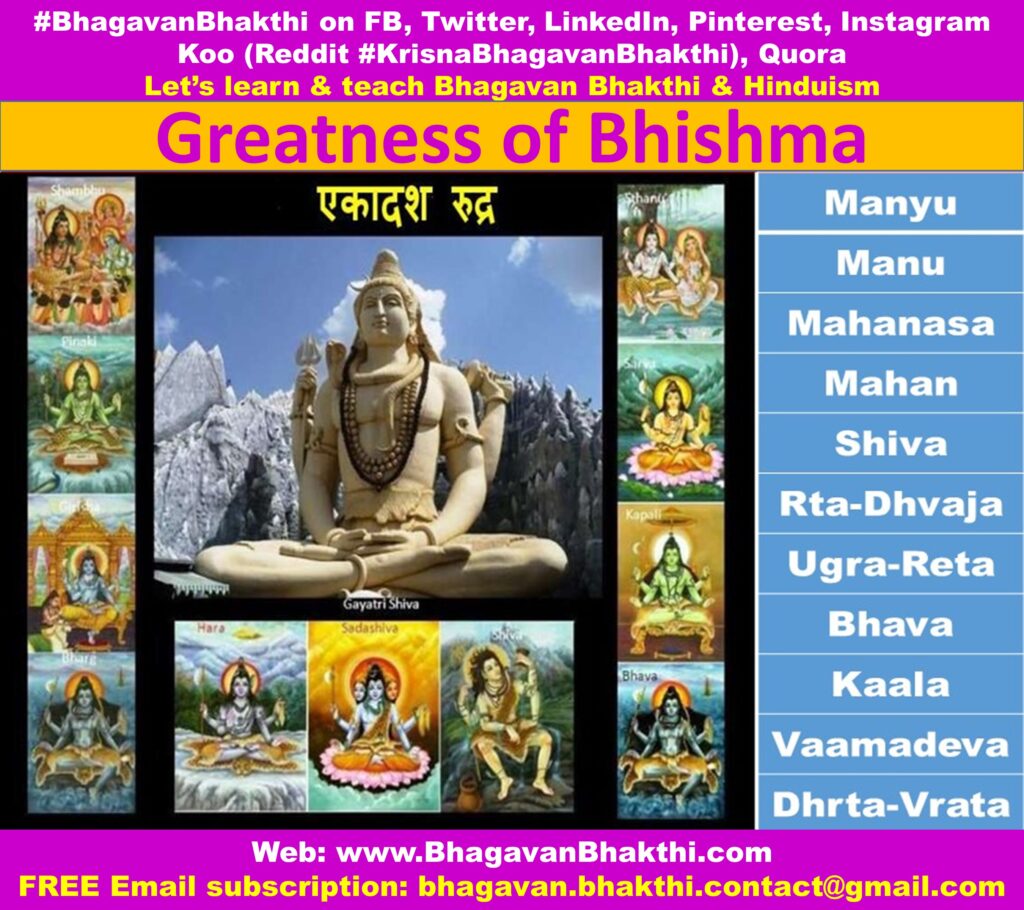
Dvadasha Adityas (12 Adityas) names are as given below:
AruNa | Aryama | Babhasti | Bhaanu | Divaakara | HiraNyarEtasa | Indra | Mitra | Ravi | Surya | Tapana | ViShNu |
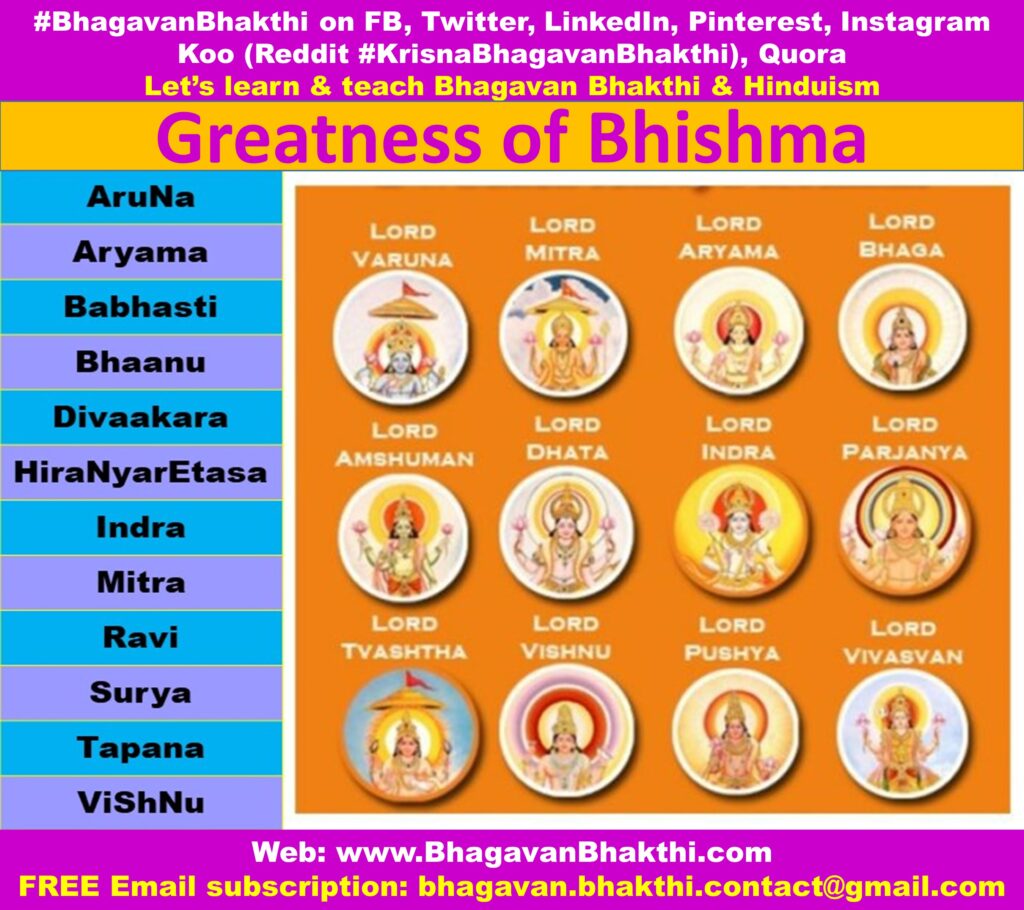
Ashta Vasus are Devatas / Demigods who dwell in the terrestrial region.
Information about Bhishma different names with meaning is as given below:
Mahamahima (महामहिम) : Even though other Kings were ruling the place of Hastinapura, Bhishma always had the highest honour, that is, more than a King.
Pitamaha (पितामह) : Bhishma is always considered as the great-grandfather and grandfather of the Kuru lineage including all the Pandavas and 100 Kauravas.
Gauranga (गौरांग) : Bhishma had a very attractive and fair colored body and thus the name Gauranga. Gau + Ranga = Fair body + colored.
Bhārata (भारत) : Bhishma was a descendant of the great King Bharata (भरत).
Shvetaveera (श्वेतवीर) : Bhishma was a white colored warrior, that is, he loved white colored things. He was dressing with white clothes, his weapons used to be white in color, etc.
Parshuramashishya (परशुरामशिष्य) : Bhishma was a great disciple of Lord Sri Parshurama, an avatar of Lord Sri Vishnu.
Shantanu Nandana (शन्तनु नन्दन) : Bhishma was the very loving son of the King Shantanu (शन्तनु).
Gangaputra (गन्गापुत्र) : Bhishma was the son of Goddess Sri Ganga Devi.
Gāngeya (गान्गेय) : Bhishma took birth from the womb of Goddess Sri Ganga Devi.
Information about Bhishma and Sankranti relationship is as given below:
Bhishma, was on the ‘Shara-panjara’ (bed of arrows) for 56 days and he was waiting for this Parva-kala (auspicious time), i.e. ‘Uttarayana Punyakala’ (Sankranti / solstice) for his last breath (Death).
It is said that one who dies during the Uttarayana Punya-kala has no rebirth (rebirth – if he does all his dharma work through out his/her life).
Information about Bhishma Ashtami (Bhishma death day) is as given below:
Bhishma Ashtami occurs on 8th day (Ashtami) of the bright fortnight (Shukla Paksha) in Magha Masam (month) as per Hindu Lunar Calendar.
This day usually falls during the months of January – February, a day after the Sun centric festival Ratha Saptami.
Why did Bhishma choose Bhishma Ashtami day as his last day (death day)?
When Bhishma made a solemn pledge (to be unmarried until death) and stood by that, his father Shantanu was very much pleased.
And thus, in gratitude of his son’s sacrifice Shantanu gave Devavrata (Bhishma) a boon that he (Bhishma) would die when he wishes, that is, ‘Ichcha Marana’ (इच्छा मरण) (Bhishma can die at his own wish and will).
Though Bhishma fell down in the war on 10th day after the commencement of the great Kurukshetra war (Mahabharata war), he eagerly and patiently waited for 58 days on the bed of arrows before departing from this world.
Bhishma (Devavrata) waited for the onset of ‘Uttarayana’ (Sankranti), the most auspicious period for a soul to depart.
Even after the onset of Uttarayana, Bhishma waited for the day of ‘Ratha Saptami’, that is, the day on which Sun’s movement takes a definite effect towards northward and on the next day (Ashtami / 8th day) Bhishma invoked his father’s boon and died.
Thus, Bhishma is said to have died in the constellation of ‘Rohini Nakshatra’, on the 68th day after the commencement of Kurukshetra (Mahabharata) war.
This day happened to be Shukla Paksha, Ashtami tithi (8th day) in the Magha masam (month) of lunar calendar.
Why should we pay salutations and obeisances to Bhishma?
A pure and noble Soul and a highly learned person, Bhishma was respected for his honesty, sincerity and strong determination.
Bhishma was a great statesman and warrior, also he was an adventurous hero and on his day it was difficult for anyone to defeat him.
For the sake of his father Shantanu, Bhishma sacrificed his marriageable life by taking an highly difficult oath of celibacy and remained without marriage.
Due to Bhishma’s commitment to the Hastinapura and Kuru lineage, he had to be on the side of Kauravas (Duryodhana) and became a silent spectator during the ugly scenes that happened in the episode of Pandavas.
Basically, Bhishma was a Devata (Demigod – one of the Ashta Vasus), he was an ardent devotee of Lord Sri Krishna, an avatar of the Supreme Lord Sri Vishnu.
Famous ‘Sri Vishnu Sahasranama Stotram’ in praise of Lord Sri Vishnu was made known, not only to Pandavas, but to the entire mankind by Bhishma himself in the presence of the Supreme Lord Sri Krishna.
Without Bhishma, we surely had missed the most sacred ‘Sri Vishnu Sahasranama Stotram’ of Lord Vishnu.
Perhaps for this great deed alone, Bhishma definitely deserves to be remembered for very long time and we should be highly and divinely proud to show salutations and obeisance’s to this great man ‘BHISHMA’.
Significance of Lord Sri Vishnu as Antaryami (who is present as divine inside) of Ashta Vasus is as given below:
‘Adhika Maasa’ (Adhik Maas) is the most sacred month dedicated to the most auspicious and Supreme Lord Sri Vishnu.
Lord Sri Vishnu is the ‘Maasa Niyaamaka’ (main controller of that month) of ‘Adhika Masam’ (Adhik Maas) in the name Purushottama.
For this reason, Adhika Masam (Adhik Maas) is also referred as Purushottama Masam (month) (maas).
Ashta Vasus (8) + Ekadasha Rudras (11) + Dvadasha adityas (12) + Prajaapati (1) + Vashatkaara (1), thus making a total of 33.
All these together are the Presiding Deities of Adhika Masam (Adhik Maas) (see above for the names of these Gods) with Lord Sri Vishnu in the name of Purushottama (another name of Lord Sri Vishnu) being the governing Lord and Antaryaami (who is present as divine inside).
Let us one by one know Lord Sri Vishnu’s names with explanation as the antaryami of different Vasus (family of Bhishma as a Vasu):
Information about Lord Sri Adhokshaja (Vishnu) as the antaryami of the Vasu named Dyau / Dyu (Bhishma) is as given below:
Lord Sri Adhokshaja is one of the unlimited names of Lord Sri Vishnu. We can find a reference to this name in shloka no. 44 of Sri Vishnu Sahasranama Stotram.
वैकुण्ठः पुरुषः प्राणः प्राणदः प्रणवः पृथुः । हिरण्यगर्भः शत्रुघ्नॊ व्याप्तॊ वायुरधॊक्षजः ॥ 44 ॥
Lord Sri Adhokshaja is one of the great features of the Sarvottama / Supreme Lord Sri Vishnu.
Here, ‘Akshaja’ means knowledge emanating from senses.
Lord Sri Adhokshaja is, someone who is beyond perception through senses, beyond knowledge acquired through senses, the one who has eternal knowledge which will never degenerate or perish.
In the ‘Sri Venkatesha Stotram’ from ‘Brahmanda Purana’, Lord Sri Venkateshwara (Bhagavan Balaji) is addressed as ‘Adhokshaja’.
For ordinary human beings he is just a ‘Shila Vigraha’ (statue / idol), but at ‘Tirumala Kshetra’, Lord Sri Venkateshwara is standing in His original roopa / form and is beyond our perception.
(His body is Aprakruta – someone who is not natural or simple like others starting from Lord Sri Brahma Deva.)
Information about Lord Sri Vishnu as antaryami of the Vasu named Drona is as given below:
No can be equal to or above Lord Sri Vishnu is the primordial Sarvottama / Supreme Bhagavan (God).
Lord Sri Vishnu is the ultimate, he pervades the many, various and different objects of multiverses and all the souls.
Lord Sri Vishnu stays as the inner soul of every living and non-being. Lord Sri Vishnu protects and enjoys all entities in the multiverses, but still remains unscathed by their faults.
Lord Sri Vishnu is indestructible. Lord Sri Vishnu is present since the unknown time and will remain until the grand infinite period.
Lord Sri Vishnu is the solitary unique soul of outstanding excellence. Lord Sri Vishnu is the mega spirit (atma) present in every being of the multiverses and the only Aatman (soul) that existed in the beginning before the creation of the multiverses.
Lord Sri Vishnu is the one who dwells in each and every element of this multiverses and everything dwells in Him.
एको विष्णुर्महद्भूतं पृथग्भूतान्यनेकशः । त्रींलोकान्व्याप्य भूतात्मा भुङ्क्ते विश्वभुगव्ययः ॥ 20 ॥
ēkō viṣṇurmahadbhūtaṁ pr̥thagbhūtān’yanēkaśaḥ। trīnlōkānvyāpya bhūtātmā bhuṅktē viśvabhugavyayaḥ ॥ 20 ॥
ಏಕೋ ಏಕೋ ವಿಷ್ಣುರ್ಮಹದ್ಭೂತಂ ಪೃಥಗ್ಭೂತಾನ್ಯನೇಕಶಃ । ತ್ರೀಂಲೋಕಾನ್ವ್ಯಾಪ್ಯ ಭೂತಾತ್ಮಾ ಭುಂಕ್ತೇ ವಿಶ್ವಭುಗವ್ಯಯಃ ॥ 20 ॥
This is taken from ‘Sri Vishnu Sahasranama Stotram – Phala Shruti’ shloka no. 20.
Ancient Hindu scripts declare Bhagavan / God as “Eko Vishnu Mahadbhootah”, that is, there is only one gigantic presence in the world and that is none other than Lord Sri Vishnu who is present in everything and everywhere.
Lord Sri Vishnu is matchless and unparalleled in excellence, he is the primordial Sarvottama / Supreme Lord, the mega spirit, pervades the many, in various forms and different objects of multiverses.
Lord Sri Vishnu lasting as the inner soul of everyone, He protects and enjoys all entities in the multiverses and yet remains unscathed by their faults and He is indestructible.
Lord Sri Vishnu is free from all imperfections and possessor of auspicious, best and unlimited attributes.
Lord Sri Vishnu is the one who is always joyous and the one who gives delight (Aananda) to the multiverses. Thus he is known as ‘aatma kaama’.
Lord Sri Vishnu is the origin of happiness, the ultimate abode of delight and is perennially blissful. Lord Sri Vishnu is the remover of all sorrows.
Information about Lord Sri Jishnu as the antaryami of Vasu named Dhruva is as given below:
Lord Sri Jishnu is one of the names of Lord Sri Vishnu.
In ‘Vishnu Sahasranama Stotram’, Bhishma describe Lord Sri Vishnu as “Vishum Jishnum MahaaVishnum PrabhaVishnum”.
Here ‘Jishnu’ means the one who is always victorious, the one who always vanquish, the one who is always triumphant, the one who always excels etc.
Jishnu is one of the salient features of the Sarvottama / Supreme Lord Sri Vishnu. Lord Sri Jishnu is the Sarvottama / Supreme Lord is ever victorious.
Lord Sri Jishnu is the personification of ‘Vijaya and Jaya’ (victorious and always victorious). Lord Sri Jishnu is invincible.
Lord Sri Jishnu’s very nature is ‘victory’ and is always triumphant. Lord Sri Jishnu’s very name, thought and devotion bring victory to His devotees.
Vijaya (victory) is one of the unlimited names of Lord Sri Vishnu (Sri Vishnu Sahasranaama Stotra sloka no. 16).
Lord Sri Jishnu is the one who grants success in all endeavors (Vijaya / Victory) to the deserving as per his / her capabilities.
Lord Sri Jishnu / Vishnu is both ‘Vijaya’ and ‘Jaya’. Lord Sri Jishnu / Vishnu is ‘Vijayo-Jaya Vardhana’, that is, the someone who always flourishes in victory.
Information about Lord Sri Keshava as the antaryami of the Vasu named Praana is as given below:
Lord Sri Keshava is one of the popular names of Lord Sri Vishnu.
Name Lord Sri Keshava is considered as ‘Moolaroopa’ (original form) of the Primordial Sarvottama / Supreme Lord Sri Vishnu.
Lord Sri Keshava is the origin and governing Bhagavan / Lord / God of Lord Sri Brahma Deva + Rudra Deva.
The name ‘Kesha’ is a Sanskrit name word. It’s meaning is hair(s) or a ray of light.
Thus the meaning of the name Keshava is, the one who has got a very long and beautiful hair with golden color. Those hairs are very charming, filled with supreme sugandha / fragrance.
Lord Sri Keshava is the someone, who is the tormentor of his enemies, and the one who’s very chanting removes sorrows and sufferings.
Without chanting of the name Keshava (Sri Kesavaaya Namaha) none of the Vedic rituals begins.
Another meaning of the name Keshava is, someone who is the slayer of the demon named ‘Keshi’ and hence is referred as Keshiha.
Lord Sri Krishna is famously called as ‘Keshava’. We can easily find a reference to the name ‘Keshava’ in the shloka no. 3 and 69 of Sri Vishnu Sahasranaama Stotram.
कालनॆमिनिहा वीरः शौरिः शूरः जनॆश्वरः । त्रिलॊकात्मा त्रिलॊकॆशः कॆशवः कॆशिहा हरिः ॥ 69 ॥
Information about Lord Sri Maha Vishnu as the antaryami of the Vasu named Dosha is as given below:
In the very first shloka of ‘Sri Vishnu Sahasranama Stotram’, Lord Sri Vishnu is referred to as ‘Bhoota-Bhavya-Bhavat-Prabhuh’.
Lord Sri Vishnu is Lord (God) of the past (bhoota), present (bhavya) and future (bhavat).
Lord Sri Vishnu is the ‘Mahadbhootah’, that is, someone who is an ultimately and gigantically present in this multiverses.
Lord Sri Vishnu is the ‘Bhootaatma’, that is, someone who dwells in all beings and is present in everything and everywhere. Lord Sri Vishnu is beyond description.
Lord Sri Vishnu is the greatest and ultimate Bhagavan / God, that is, someone who is all pervasive, eternal, beyond all boundaries and for whom there is no limit either by space, time or location.
Lord Sri Vishnu is the one who has infinite number of forms and He dwells in the entire multiverses. Lord Sri Vishnu is invincible and omnipresent.
Lord Sri Vishnu’s glory is infinite. Lord Sri Vishnu is highly meritorious among the most meritorious.
No one can describe or define Lord Sri Maha Vishnu precisely. Starting from Goddess Sri Lakshmi Devi, Lord Sri Brahma Deva, Goddess Sri Sarasvati Devi, Lord Sri Rudra Deva, Goddess Sri Parvati Devi, Lord Sri Indra Deva etc. etc. etc., no one can’t precisely describe Lord Sri Vishnu.
Lord Sri Vishnu is the Lord of Lords (God of the Gods), that is, Sarvottama / Supreme Bhagavan (Lord) (God).
Information about Lord Sri Vishnu (Hari) as the antaryami of the Vasu named Arka is as given below:
The name ‘Hari’ refers to the green colored Supreme Lord Sri Vishnu. He is called as Lord Sri Hari and is he ‘saakshaat’ (yes definitely) the ‘Parabrahma’ Lord Srimann Narayana (Vishnu) the ‘Moksha kaaraka’, that is, someone who is the destroyer (Hari) of the cycle of birth and death.
Lord Sri Hari also means the one who steals, that is, someone who steals (destroys) our ignorance.
Information about Lord Sri Krushna (Krishna) as the antaryami of the Vasu named Agni is as given below:
In the 10th chapter of the Great Srimad Bhagavad Gita, that is, in the ‘Vibhooti Yoga’, Lord Sri Krushna (Krishna) says that, “Vasuunaam Paavakaschaasmi”, that is, ‘I am (Lord Sri Krishna) the Agni among all the Vasus’. Paavaka is another name of Agni.
Even though he is called by various names like Keshava, Govinda, Damodara etc., He is very popularly and lovingly known as Lord Sri Krishna.
It is said that the name Lord Sri Krishna was suggested by Rishi / Sage Garga who had earlier meditated on this name before Lord Sri Krishna’s avatar on this earth.
(We should note that Lord Sri Vishnu had this name Lord Sri Krishna earlier itself. This name Lord Sri Krishna and all the Lord Sri Vishnu’s names are existing since the unknown time and will prevail until the grand infinite period.)
We find a reference to the name ‘Krishna’ in shloka no. 7 of ‘Sri Vishnu Sahasra Naama Stotram’ as given below:
‘Agraahyah shaashvathah Krishna lohitaakshah pratardanah’
The name and the word ‘Krishna’ is actually to be pronounced as ‘Krushna’ or Krshna, meaning dark in color and is all attractive.
In the word ‘Krushna’, ‘Krush’ refers to everlasting (shaaswata) and ‘Na’ refers to ‘sath svaroopa’.
Krushna means ‘Sat-Chit-Ananda’, that is, someone who is complete and blissfully happy for ever.
“Karshateethi Krushnah”, meaning someone who has the character, capacity and capability of attracting anyone with his beautiful, charming, delightful, every smiling and fascinating figure.
‘Krushnastu svayam Bhagavan’, that is, Lord Sri Krishna on several occasions had revealed that ‘I am the Paramatma’ (I am the ultimate soul of everyone.)
Lord Sri Krishna avatar has gained unique prominence and significance among the several avatars of Lord Sri Vishnu.
(Note: But it doesn’t mean that other avatars are not significant. All the avatars of Lord Sri Vishnu is unique and highly significant.)
(He shows the leela / drama / vidambana as per the avatar, as per time, as per the people present around him, as per the requirement etc.)
Lord Sri Krishna’s preaching through Srimad Bhagavad Gita is a Divine gift to the mankind which is accepted across the world.
The story of Lord Sri Krishna never ends. All have their own capability and our capacity to describe Lord Sri Krishna is limited and when our limit is reached we abandon it half way.
Information about Lord Sri Madhava as the antaryami as the Vasu named Vibhavasu is as given below:
Lord Sri Vishnu is called as ‘Madhava’, that is, he is the consort of ‘Madhavi’ (Goddess Lakshmi name), that means, the one who is bestower to all and Lord of Superior Knowledge.
Lord Sri Madhava is the profounder or the one who advocates or the one who promulgate the knowledge of the Supreme being (Himself).
Lord Sri Madhava is someone who directs an individual towards performing of good deeds and attaining true knowledge.
Lord Sri Madhava is “Madhavo-Madhusoodhana”, that is, someone who is as sweet and delicious as ‘Madhu’ (divine honey) and also someone who is a great nourisher.
Also, Lord Sri Madhava is someone who is the slayer of demon named Madhu; the one who was born in the clan of King Madhu. Thus he is known as ‘Madhusudana’.
We find a reference to the words Madhava / Madhusudana in shloka no. 8,18,78 of Sri Vishnu Sahasranama Stotram.
ईशानः प्राणदः प्राणॊ ज्यॆष्ठः श्रॆष्ठः प्रजापतिः । हिरण्यगर्भॊ भूगर्भॊ माधवॊ मधुसूदनः ॥ 8 ॥
वॆद्यॊ वैद्यः सदायॊगी वीरहा माधवॊ मधुः । अतीन्द्रियॊ महामायॊ महॊत्साहॊ महाबलः ॥ 18 ॥
ऎकॊ नैकः सवः कः किं यत्तत्–पदम नुत्तमम् । लॊकबन्धुर्–लॊकनाथॊ माधवॊ भक्तवत्सलः ॥ 78 ॥
More information will be added to this on regular basis, please visit after some time to know more information.
To watch videos on #Hinduism #Sanskrit language, SUBSCRIBE to my YouTube channel from this below link:
#BhagavanBhakthi YouTube channel
Continue reading to know about “Mahabharata information, facts, significance, importance” from here:
Mahabharata information, facts, significance, importance
Continue reading to know about “Lord Sri Vishnu information (facts) (details)” from here:
Lord Sri Vishnu information (facts) (details)
To watch about “Lord Sri Krishna information” YouTube video, click the below YouTube video link:
Lord Sri Krishna information (YouTube videos)
To read about “Lord Sri Krishna information (website / blog reading)“, please click the below link:
Lord Sri Krishna information (website / blog reading)
Dear friends, if you need any clarifications about this post, kindly let me know, I will definitely try to answer all of them.
Also your one LIKE, one COMMENT, One Share, one SUBSCRIPTION is highly important.
This will help to know the quality of this content and also it will be helpful to know if any improvements is required for the content.
If you feel this content is useful to you and has helped you to improve your knowledge, kindly share this with your well-wishers.
Because “SHARING MEANS CARING”.
To receive FREE EMAIL SUBSCRIPTION about #BhagavanBhakthi, you can send an email to [email protected] from your email ID.
NAMASTE!
Sri Gurubhyo Namaha
Sri Krishnaaya Namaha
Sri Krishnaarpanamastu
Share in Social Media